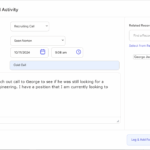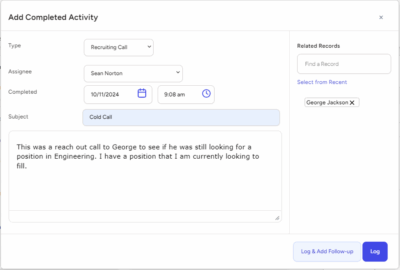In the realm of talent acquisition, executive recruiters and search consultants grapple with an array of challenges within a fast-paced environment. The pursuit of top-tier candidates is met with intense competition, client demands continue to shift, and the call for inventive solutions has reached new heights. Within this dynamic context, the utilization of a personalized recruitment CRM (Customer Relationship Management) platform stands out as a transformative tool for recruitment agencies.
This blog post delves into the indispensable role of CRM in tailoring the recruitment process, elevating client satisfaction, and bolstering conversion rates for astute recruitment agencies.
Understanding Personalized Recruitment CRM
The concept of personalized recruitment has revolutionized the way recruitment agencies engage with candidates and clients alike. Gone are the days of generic, one-size-fits-all approaches. Today’s candidates and clients demand tailored experiences that align with their unique needs, preferences, and organizational cultures. Personalized recruitment leverages technology, data, and strategic insights to create meaningful connections and deliver customized solutions. At its core lies CRM, a powerful tool that empowers recruitment agencies to understand, engage, and nurture talent in a highly personalized manner.
To truly grasp the essence of personalized recruitment, it’s essential to recognize its key components:
Candidate-Centric Approach
At the heart of personalized recruitment is a deep understanding of candidates’ aspirations, motivations, and career goals. Rather than treating candidates as mere commodities, recruitment agencies strive to build meaningful relationships based on trust, transparency, and mutual respect. This approach involves actively listening to candidates, understanding their unique skill sets and experiences, and aligning them with opportunities that fulfill their professional aspirations.
Client-Centric Solutions
Personalized recruitment extends beyond candidates to encompass clients’ needs, objectives, and organizational cultures. Recruitment agencies work closely with clients to develop tailored talent acquisition strategies that address specific hiring challenges and business goals. This involves understanding clients’ industry dynamics, market trends, and competitive landscapes to deliver customized solutions that drive success.
Data-Driven Insights
Central to personalized recruitment is the utilization of data and analytics to gain actionable insights into candidate behavior, client preferences, and recruitment trends. Recruiting CRM platforms serve as repositories of valuable information, enabling recruiters to capture, analyze, and leverage data to make informed decisions. By harnessing data-driven insights, recruitment agencies can optimize their recruitment strategies, anticipate market shifts, and proactively address challenges.
How to Unlock the Power of CRM in Recruitment
CRM software serves as a catalyst for personalized recruitment efforts, empowering recruitment agencies to unlock new levels of efficiency, effectiveness, and engagement. Here’s how recruitment agencies can harness the power of CRM to drive success:
Holistic Candidate Management
CRM platforms offer a centralized repository for managing candidate data, facilitating seamless access to information such as resumes, skill sets, and communication preferences. This comprehensive view enables recruiters to track candidate interactions, assess suitability for specific roles, and personalize engagement strategies accordingly. By leveraging CRM’s robust search and filtering capabilities, recruitment agencies can identify top talent more efficiently and match them with relevant opportunities.
Targeted Client Engagement
CRM enables recruitment agencies to segment clients based on various criteria such as industry, geography, and hiring needs. By categorizing clients into distinct groups, recruiters can tailor their communication strategies, marketing campaigns, and service offerings to meet specific client requirements. Whether it’s providing industry-specific insights, highlighting relevant talent pools, or offering tailored recruitment solutions, CRM empowers recruiters to deliver value-added services that resonate with clients.
Streamlined Communication Channels
Effective communication lies at the heart of successful recruitment outcomes. CRM platforms streamline communication channels by consolidating emails, messages, and interactions into a single interface. Recruiters can leverage CRM’s automation features to schedule follow-up emails, send personalized messages, and track communication history with candidates and clients. By maintaining consistent and timely communication, recruitment agencies can enhance engagement, build trust, and foster long-lasting relationships.
Data-Driven Decision Making
Recruiter CRM platforms provide recruitment agencies with access to real-time data and analytics, enabling them to make data-driven decisions across the recruitment lifecycle. By analyzing key metrics such as time-to-fill, candidate quality, and source effectiveness, recruiters can identify trends, patterns, and areas for improvement. CRM dashboards and reports offer insights into recruitment performance, enabling recruiters to optimize their processes, allocate resources effectively, and drive better outcomes for clients and candidates alike.
Customizing the Candidate Journey
Personalizing the candidate journey is essential for creating memorable experiences that resonate with candidates and drive engagement. CRM plays a pivotal role in customizing the candidate journey by enabling recruiters to deliver tailored solutions at every touchpoint. Here’s how recruitment agencies can leverage CRM to personalize the candidate journey:
Personalized Outreach
CRM allows recruiters to craft personalized outreach messages that resonate with candidates on a personal level. By leveraging CRM data such as job preferences, skills, and career aspirations, recruiters can tailor their messaging to address candidates’ specific needs and interests. Whether it’s highlighting relevant job opportunities, sharing industry insights, or offering career advice, personalized outreach helps recruiters stand out and capture candidates’ attention.
Seamless Communication
CRM facilitates seamless communication between recruiters and candidates, ensuring that candidates receive timely updates, feedback, and support throughout the recruitment process. Recruiters can use CRM’s communication tools to schedule interviews, send follow-up emails, and provide status updates on job applications. By maintaining open lines of communication, recruiters can keep candidates engaged, informed, and motivated throughout their journey.
Tailored Job Recommendations
CRM’s candidate matching algorithms enable recruiters to deliver personalized job recommendations based on candidates’ skills, experiences, and preferences. By analyzing candidate profiles and job requirements, CRM can identify suitable matches and suggest relevant job opportunities to candidates. This personalized approach not only enhances the candidate experience but also increases the likelihood of successful placements and long-term retention.
Proactive Relationship Management
Beyond the initial interaction, CRM enables recruiters to proactively manage candidate relationships over time. By staying connected through personalized follow-ups, career development resources, and networking opportunities, recruiters can nurture talent pipelines and build lasting connections with candidates. CRM’s automation features make it easy to schedule follow-up activities, set reminders, and track interactions, ensuring that candidates receive the support and attention they deserve throughout their journey.
Elevating Client Satisfaction
In addition to enhancing the candidate experience, CRM plays a crucial role in elevating client satisfaction and driving business growth. By delivering personalized recruitment solutions that align with clients’ objectives and values, recruitment agencies can solidify their reputation as trusted partners and industry leaders. Here’s how recruitment agencies can leverage CRM to elevate client satisfaction:
Personalized Recruitment CRM: Tailored Strategies
CRM enables recruiters to collaborate closely with clients to develop tailored talent acquisition strategies that address specific hiring challenges and business objectives. By leveraging CRM insights, recruiters can provide clients with actionable recommendations, market insights, and competitive intelligence to inform their hiring decisions. This strategic partnership approach fosters trust, transparency, and alignment between recruiters and clients, driving better outcomes for both parties.
Real-Time Collaboration
CRM facilitates real-time collaboration between recruiters and clients, enabling them to share information, track progress, and make decisions together. Recruiters can use CRM to provide clients with access to candidate profiles, job openings, and recruitment metrics, empowering them to actively participate in the recruitment process. By fostering transparency and accountability, CRM strengthens the client-agency relationship and ensures that both parties are aligned towards achieving shared goals.
Performance Transparency
CRM provides clients with visibility into recruitment performance metrics, enabling them to track progress, measure outcomes, and assess ROI. Recruiters can use CRM dashboards and reports to share key metrics such as time-to-fill, candidate quality, and cost per hire with clients, providing them with actionable insights into recruitment effectiveness. This transparency builds trust and credibility with clients, demonstrating the value that recruiters bring to the table and fostering long-term partnerships.
Continuous Improvement
CRM serves as a catalyst for continuous improvement, enabling recruiters to solicit feedback, identify areas for improvement, and iterate on their recruitment strategies. By leveraging CRM analytics and reporting tools, recruiters can analyze performance trends, identify bottlenecks, and implement targeted improvements to enhance recruitment outcomes. This iterative approach to recruitment ensures that recruiters stay agile, adaptive, and responsive to clients’ evolving needs, driving continuous improvement and innovation.
Customize the Journey for Exceptional Value
Personalizing the recruitment journey with CRM is essential for executive recruiters and search consultants looking to stay ahead in today’s competitive talent landscape. By leveraging CRM to understand personalized recruitment, unlock its power in recruitment processes, customize candidate journeys, and elevate client satisfaction, recruitment agencies can differentiate themselves, attract top-tier talent, and delight clients with tailored solutions.
Embracing CRM as a strategic enabler of personalized experiences is not just a competitive advantage – it’s a necessity for navigating the complexities of modern recruitment and unlocking new opportunities for growth and innovation. As recruitment continues to evolve, executive recruiters and search consultants must embrace CRM as a strategic imperative for delivering exceptional value, driving client satisfaction, and achieving sustainable growth in the dynamic talent landscape.








